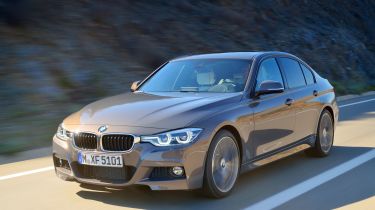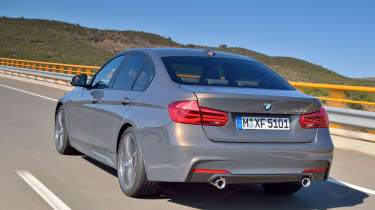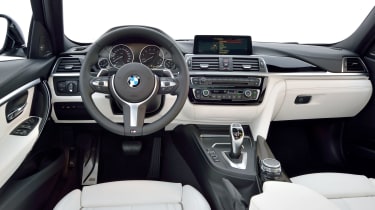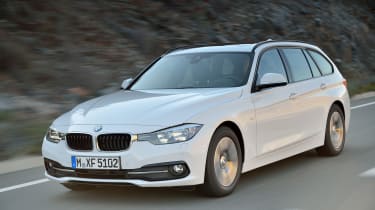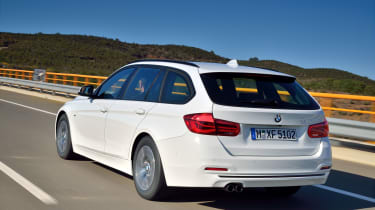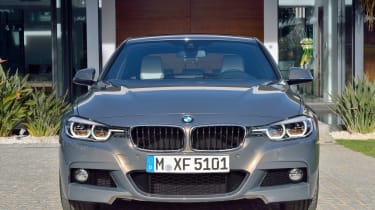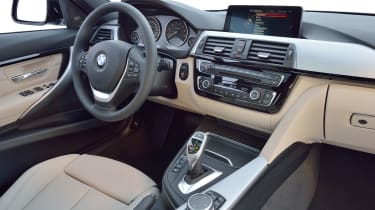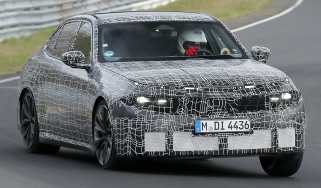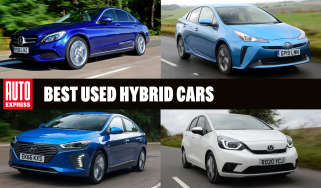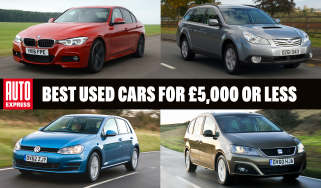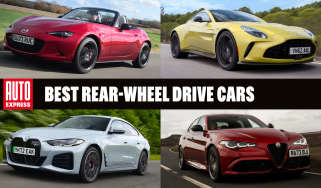BMW 3 Series 2015: engine, tech and styling tweaks
BMW updates the 3 Series range with new engines, a 330e plug-in hybrid and subtle styling tweaks
BMW has revealed its new 3 Series, and although it doesn’t look that different to the current best-selling compact exec, it’s been heavily revised.
Shown in Munich last week in saloon and Touring guises, the new 3 Series gets some vital tweaks, including a new three-cylinder turbo petrol engine and a frugal plug-in hybrid, badged 330e. The styling has been subtly updated inside and out, too, to keep the car competitive against an increasingly talented pool of rivals, including the new Jaguar XE, Mercedes C-Class and upcoming Audi A4.
The mid-life updates mark 40 years since the debut of the original E21 3 Series back in 1975. After just three years, that model had boosted global BMW sales by 74 per cent, and the 3 Series has continued as the brand’s most popular car ever since. Over 14 million examples have now found homes around the world, with the 3 Series accounting for about 25 per cent of the brand’s global sales.
BMW 3 Series 2015 updates
BMW clearly doesn’t see the handsome XE as too much of a threat, as it’s only restyled the lights and carried out some small bumper tweaks. Optional full-LED headlamps get bold ‘eyebrow’ indicators, while the standard units feature revised LED daytime running lights. Below this, designers have installed broader side air vents, as well as a reshaped central intake – discreetly housing the car’s radar cruise control.
At the rear, all cars get new tubular LEDs as standard. The L-shaped light bars feature brake lights which respond faster to your right foot, according to BMW, and two-piece LED indicators that are heavily curved for a more distinctive design. Strangely, this means it’s easier to separate old car from new in the dark than it is during the day.
Inside, BMW claims perceived quality and ergonomics are improved, with new high-gloss plastics and chrome materials to tempt customers away from the acclaimed cabin of the C-Class. Sat-nav is now standard across BMW’s entire range, and the 3 Series can be specced with a new Professional nav system that gets faster software, free over-the-air map updates and 4G connectivity.
New engine tech for the 3 Series
Under the skin, though, lots more has been revised, with the engine line-up getting a complete overhaul. BMW is claiming CO2 improvements of up to 13 per cent, as well as power upgrades across the range. The most notable addition is a new 318i with the three-cylinder ‘TwinPower’ turbo taken from the MINI Cooper. This replaces the 316i as the entry-level engine, and produces 134bhp and 220Nm of torque. It’ll do 0-62mph in 8.9 seconds and hit a 130mph top speed, while automatic versions get an overboost function providing an extra 10Nm of torque on kickdown. The 318i will return up to 54.3mpg and emit 122g/km of CO2.
A new 2.0-litre four-cylinder petrol engine also debuts, delivering 181bhp and 249bhp in the 320i and 330i respectively. The latter replaces the old 328i, emitting eight per cent less CO2, at 136g/km. The 320i is ever so slightly cleaner (134g/km), but sits in the same road tax band, so it costs £130 a year.
Continuing the badge shuffling, the 3.0-litre turbocharged six-cylinder is now labelled as the 340i, instead of 335i. It’s been uprated to produce 321bhp (15bhp more than before) and emit from 152g/km.
Company car drivers will inevitably be drawn to the upcoming 330e plug-in hybrid, which is set to go on sale early next year. This claims 134.5mpg and emits 49g/km of CO2 – making it exempt from road tax and the London Congestion Charge. It promises an electric-only range of 22 miles and will fall into the lowest Benefit in Kind company car tax bracket. Plus, with 249bhp, it’ll do 0-62mph in 6.3 seconds and hit 140mph.
The four-cylinder diesels now come from the EfficientDynamics ‘TwinPower’ engine family, with all boasting improved efficiency and extra power. Pick of the range is the revised 320d ED (opposite), which matches the most efficient XE by slipping under the free road tax barrier – claiming 99g/km CO2 emissions. You’ll need to spec the 16-inch wheels and eight-speed auto box to keep it under the 100g/km threshold, but the low-drag tyres and partially masked kidney grille are standard. The manual car emits 102g/km, for £20 tax or 18 per cent Benefit in Kind.
As before, buyers also get the choice of six-cylinder diesel 330d and 335d models, but there’s no official word on a flagship 340d yet. Still, sources suggested this could be just around the corner, bringing the diesel badging in line with the potent petrols.
The flagship M3 also benefits from the saloon’s visual upgrades, with full-LED tail-lights and tweaks to the interior. Professional navigation is standard, while four new colours – Smoked Topaz, Azurite Schwarz, Champagne Quartz and Tanzanite Blue – are also available. Buyers of all other models have the option of 16 exterior colours, including four new shades from the standard and ‘BMW Individual’ range.
Specs are still to be finalised, but the 320i, 320d and 330d will all be available with xDrive four-wheel drive. The 335d gets the added traction as standard, while all other models are rear-driven as before.
The trim line-up of SE, Sport, Luxury and M Sport will continue, with top-spec M Sport cars featuring leather, an M Sport bodykit, sports suspension and sports seats. All cars now get larger tailpipes, with flagship models available on optional 20-inch alloy wheels.
BMW has also optimised the ride and handling for the 2015 facelift, claiming new damper technology and stiffer suspension maintain current comfort levels, yet givethe car an even sportier feel. We’ll reserve judgment on whether those claims are justified until we drive it later this year.
We’ll have to wait until nearer the launch for specific price and spec info, while updated versions of the 3 Series GT and 4 Series won’t arrive until mid 2016.
2015 BMW 3 Series vs Jaguar XE and Mercedes C-Class
BMW 320d ED
Price: £31,500 (est)Engine: 2.0-litre 4cyl dieselPower/torque: 161bhp/400NmTransmission: Eight-speed auto, rear-wheel drive0-62mph: 7.8 secondsEconomy: 74.3mpgCO2: 99g/km
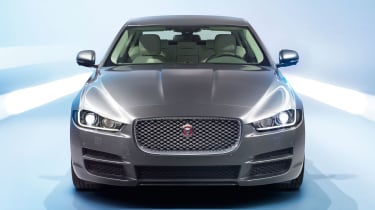
Jaguar XE 2.0 D SE
Price: £29,775Engine: 2.0-litre 4cyl dieselPower/torque: 161bhp/380NmTransmission: Six-speed manual, rear-wheel drive0-62mph: 8.4 secondsEconomy: 74.3mpgCO2: 99g/km
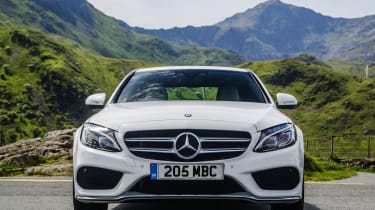
Mercedes C 200 BlueTEC SE
Price: £28,910Engine: 1.6-litre 4cyl dieselPower/torque: 134bhp/320NmTransmission: Six-speed manual, rear-wheel drive0-62mph: 9.7 secondsEconomy: 72.4mpgCO2: 101g/km
The headline figure from BMW’s new 3 Series reveal was 99. That’s how many grams of CO2 the revised 320d EfficientDynamics model emits per kilometre, putting it on par with Jaguar’s class-leading XE 2.0-litre diesel SE.
The figure is down from 109g/km, and means the car is now exempt from road tax. It also falls into the 17 per cent Benefit in Kind bracket for company car drivers – the same as the Jag and one per cent ahead of the most frugal Mercedes C-Class in the range.
• New 2015 Audi A4 details revealed
Claimed fuel economy for the 320d ED is 74.3mpg – that’s identical to the XE’s and marginally better than the C-Class’ 72.4mpg figure. It’s worth noting that only the auto BMW slips under the all-important sub-100g/km threshold, though – with the manual emitting 102g/km. For both the Jag and Mercedes, the manual modelsare more efficient than the respective automatics.
But what the BMW gains in efficiency, it doesn’t lose in performance. It’s the fastest of the three from 0-62mph, completing the sprint in just 7.8 seconds. The XE does it in 8.4 seconds, almost two seconds quicker than the C 200 BlueTEC, which follows in 10.1 seconds.
While we’ve not driven the BMW yet, the powerful 2.0-litre diesel is likely to feel more responsive thanks to its superior 400Nm of torque, while the auto transmission should make it more relaxing to drive. In terms of boot space, though, it’s hard to split them. The Jag’s capacity is the smallest, at 455 litres, while the other two are identical with 480 litres apiece.
When it comes to equipment, all cars get sat-nav and DAB radio as standard, as well as parking sensors and alloy wheels. However, the Mercedes and BMW make do with 16-inch rims, while the Jaguar gets bigger 17s for a more upmarket look.
On paper, the C-Class is the cheapest to buy outright. The 3 Series’ estimated price includes the automatic gearbox, but even the six-speed manual is expected to cost nearly £30,000 when it goes on sale later this year. The Mercedes and Jag can, of course, be specced with their thirstier auto boxes, for £1,575 and £1,750 respectively.
Check out our round-up of the best executive cars on sale now
Find a car with the experts

